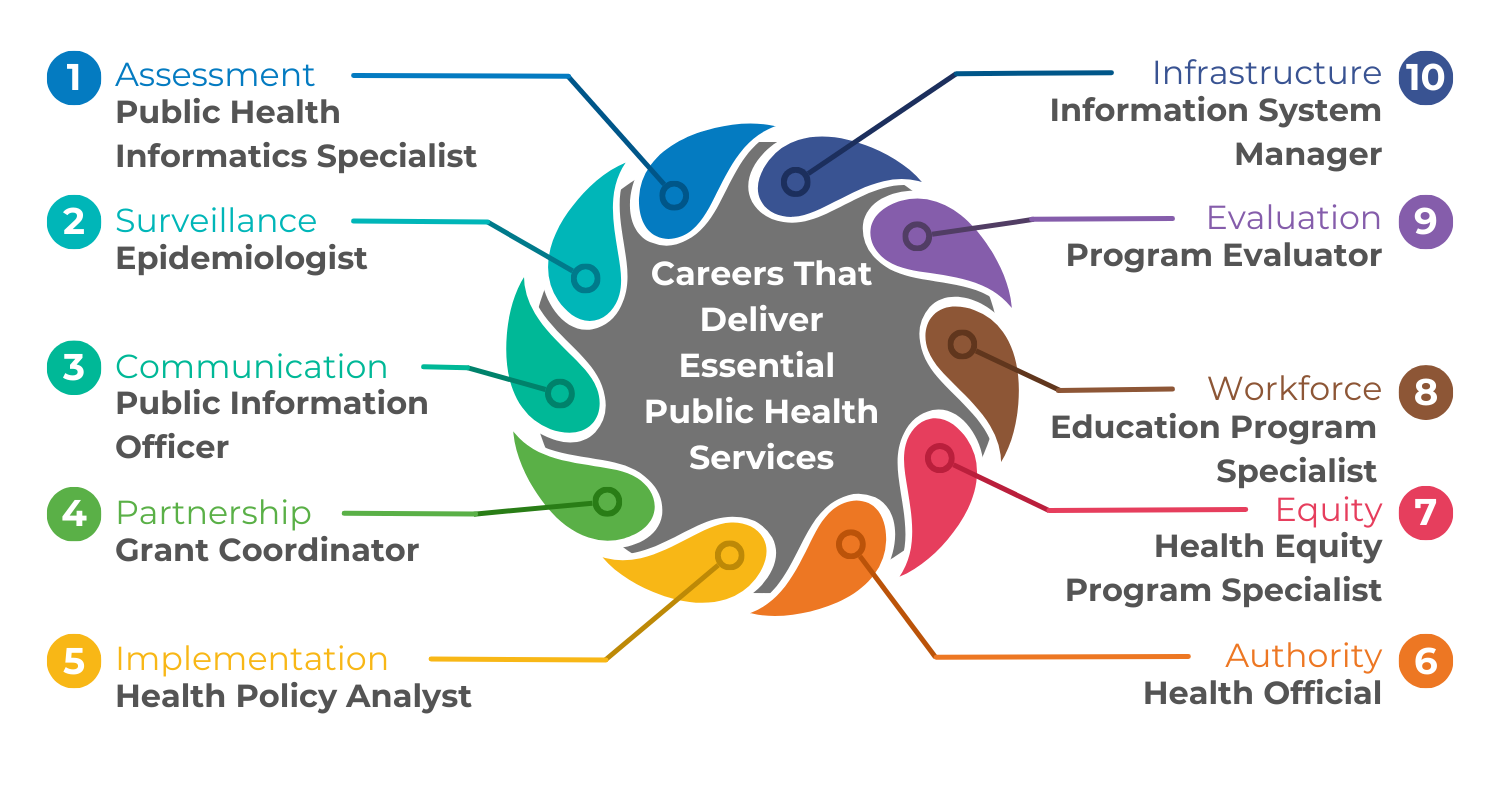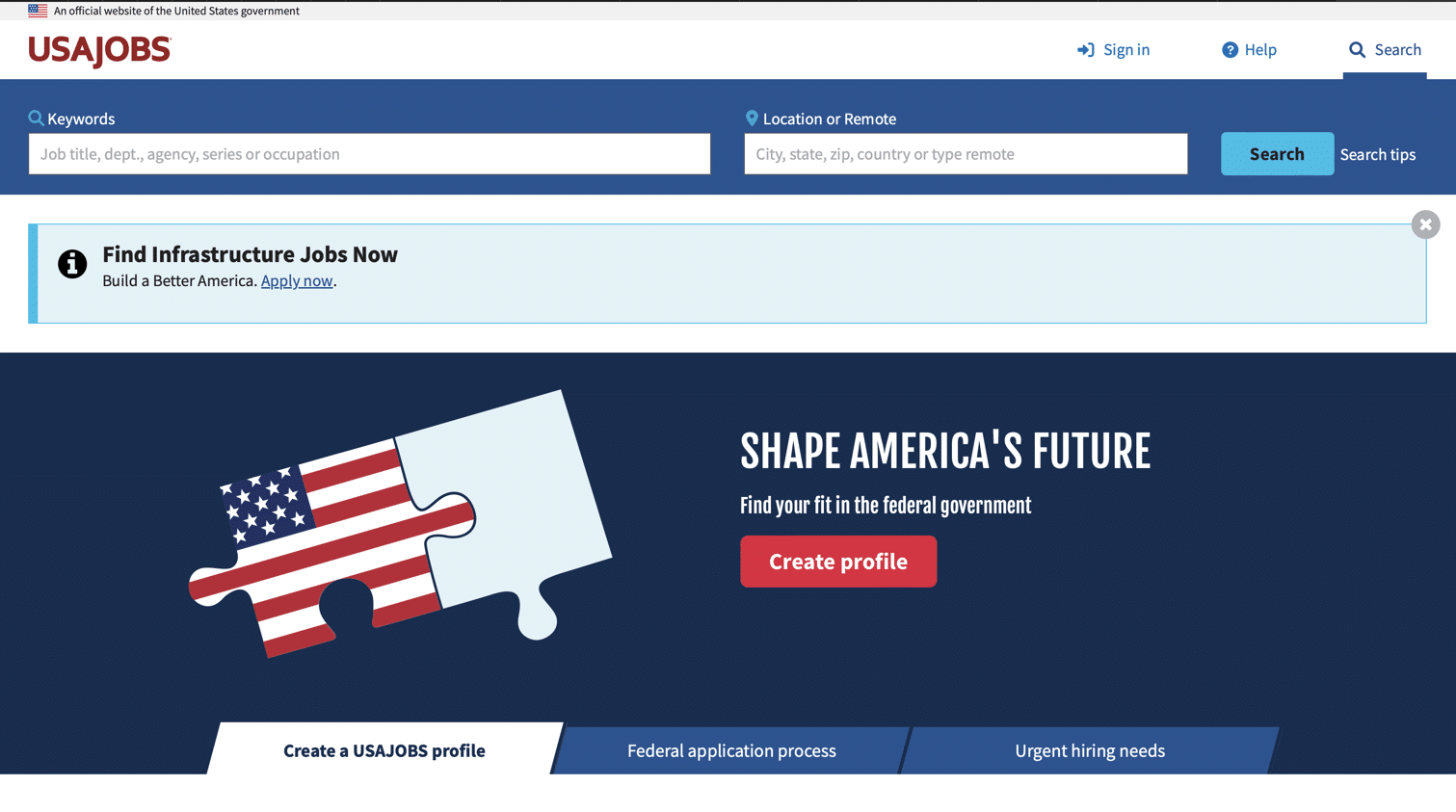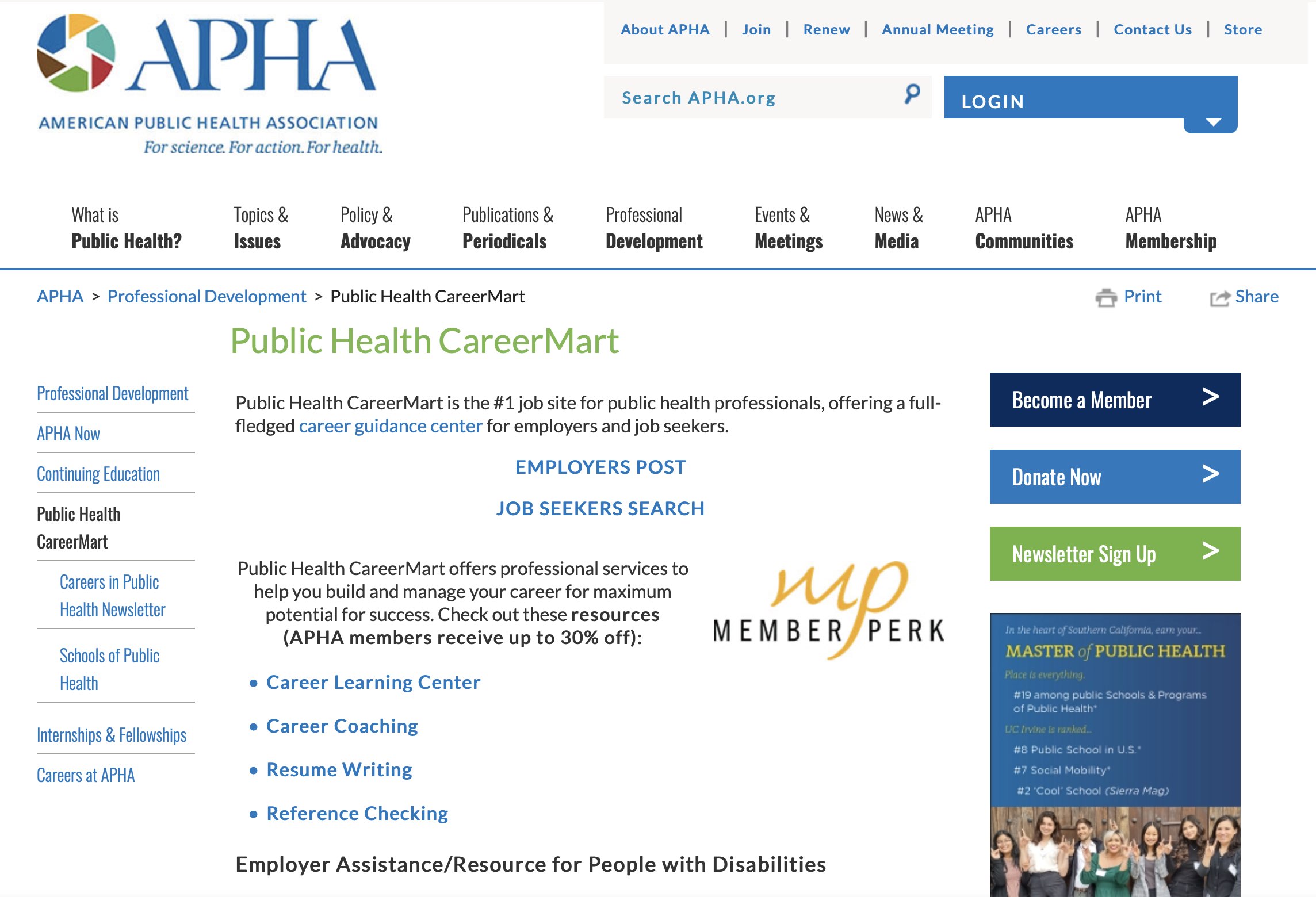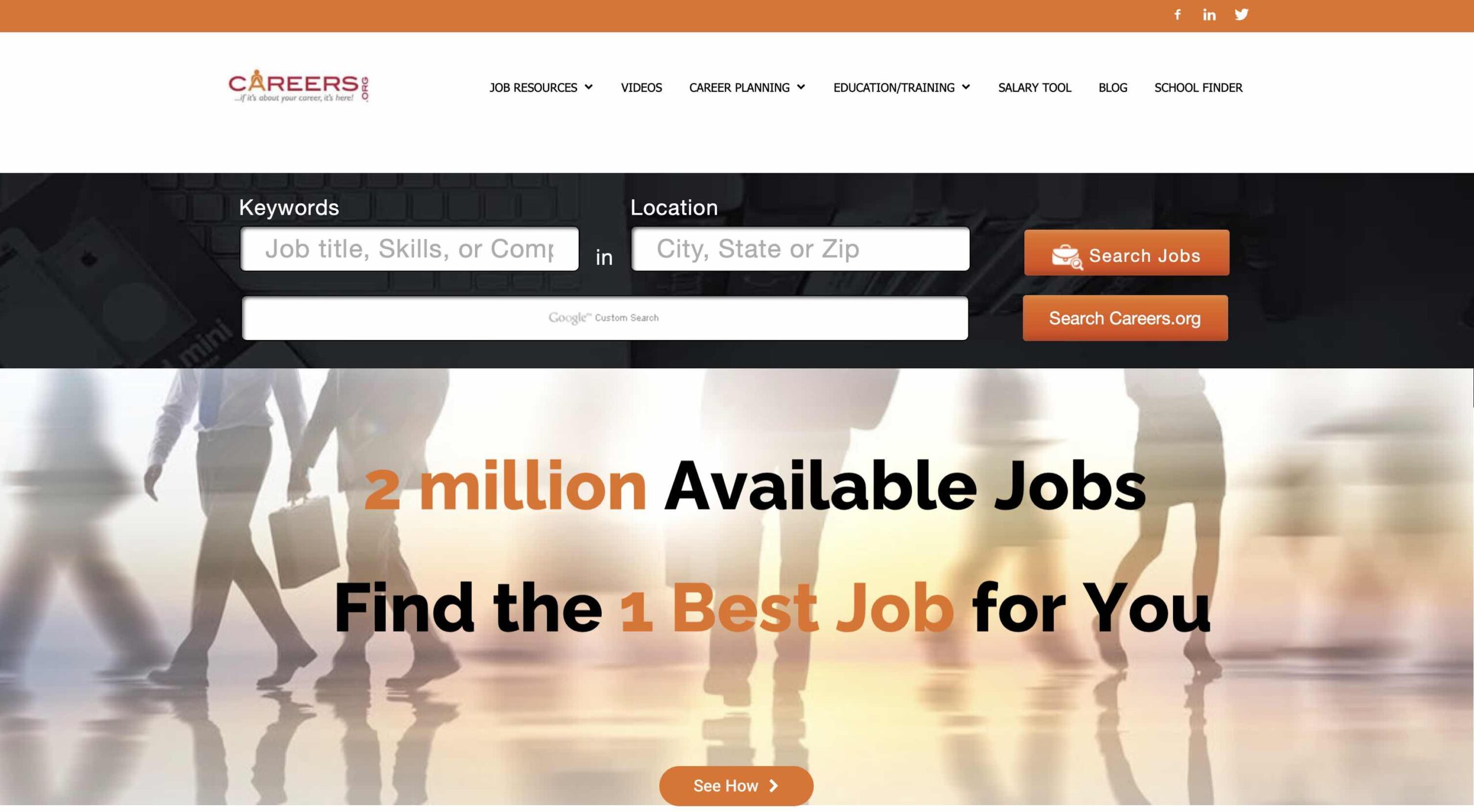Early Career Professionals How To Toolkit
How to Get Your First Public Health JobWhat is a public health job?
Public health jobs are jobs that are part of our system that delivers the 10 Essential Public Health Services. Many public health jobs are in the public sector, like those at local and county public health departments. Other public health jobs may be at nonprofits or in the private sector. People employed in Public Health jobs come from a variety of backgrounds and hold many kinds of jobs. Jobs in public health are interesting, challenging, and meaningful.
Careers in Public Health
Public health careers take many paths and span a wide variety of professions. We have assembled a handful of example public health jobs, across the Essential Public Services, that help illustrate what public health workers do!
Click to explore jobs in public health.

Public Health Informatics Specialist
A Public Health Informatics Specialist may collect, manage, and analyze health data to assess population health, contributing to Public Health’s responsibility to assess and monitor population health status.
Epidemiologist
An Epidemiologist conducts investigations to identify trends in diseases, including investigating outbreaks and epidemics, which are key aspects of the sector’s responsibility to investigate, diagnose, and address health problems.
Public Information Officer
A Public Information Officer may work for a health department, handling media requests, coordinating messaging, and providing the public with credible information and advice, filling the essential role of Public Health in communicating health information.
Grant Coordinator
A Grant Coordinator convenes a variety of stakeholders, including businesses, faith organizations, and other institutions to support, sustain, and grow community health programs. This type of Public Health worker fulfills Public Health’s responsibility to foster collaborative partnerships across sectors and communities to advance vital community conditions.
Health Policy Analyst
A Health Policy Analyst works to develop, employ, and assess health policies, fulfilling Public Health’s responsibility to create, champion, and implement policies, plans, and programs that improve health.
Health Equity Program Specialist
A Health Equity Program Specialist works to develop health equity measures and ways of reducing disparities within community health programs or healthcare organizations. These Specialists deliver on Public Health’s role in shifting systems for equity.
Education Program Specialist
A Public Health Education Program Specialist develops programs to teach others about conditions affecting health and well-being. The delivery of Public Health Education fulfills the sector’s role in building and supporting a diverse, skilled public health workforce.
Program Evaluator
A Public Health Program Evaluator works to determine the effectiveness and sustainability of public health programs and interventions, filling the role of Public Health in improving and innovating public health functions through evaluation, research, and quality improvement.
Information System Manager
An Information System Manager ensures the proper storage, cataloging, and security of public health data, maintaining data systems that are a key piece of infrastructure that forms the bedrock of an effective and resilient public health system in the process.
Get Started Guide
Searching for the job
Explore entry opportunities
As the adage goes, it is easier to get a job when you have a job. It is easier to get a job in public health when you have had some experience in public health. Limited-term internships, fellowships, and volunteer work at health departments, nonprofits, healthcare institutions, and community-based organizations can expose emerging professionals to opportunities in the field and can sometimes lead to long-term positions. Such opportunities are often available to undergraduate students, recent graduates, graduate students, and others entering the public health field. These positions can be an enriching experience and a springboard for new professionals.
Tap into your network
Some of your best job opportunities may come through your network. As you begin your job search, spend some additional time tending to and building your network. Reach out to colleagues, peers, and contacts. Get updated on their work. Share about the next career steps you are hoping to take. The beginning of a job search is an important time to expand your network as well. Career fairs, for example, are a place to learn about career opportunities and connect with potential employers, and informational interviews can provide insights into career paths, organizations, and job roles.
Utilize Available Tools
Online platforms are a place to kickstart your job search. From creating a professional online profile, to joining virtual networking events and finding and applying for jobs, online platforms are part of many job search journeys.
Create or refresh your LinkedIn profile: Create or refresh your LinkedIn profile to highlight your education, skills, and relevant experience. The professional networking site is used widely and is invaluable in connecting you with colleagues and professional groups, and delivering relevant professional content. Other professional networking sites and personal websites may also be useful.
Take to the job boards: Job boards are a place to find, and often apply to, job postings. In addition to more general sites like Indeed and Glassdoor, those searching for their first jobs in public health should explore student and alumni resources, as well as specific public health job boards.
For students and recent-graduates, handshake and other institution-sponsored platforms are gateways to job resources, networking opportunities, and more. Many public health programs run their own listservs and job boards. These resources and other resources may be available to alumni.
There are many job boards specifically for those in public health. We have compiled the below list to help job seekers get started…

USAJOBS

Public Health CareerMart

Public Health Careers

Careers.org
Landing the job
Refresh Your Resume
If you are looking for a job, it is probably time to refresh your resume! Take some time to update, edit, revamp, or completely redo your resume for a prospective job in public health. Highlight your relevant skills, experiences, and achievements related to public health, social justice, the environment, and related fields. Include internships, volunteer work, coursework, and applicable class projects. Emphasize your passion for public health. Demonstrate your commitment to health equity. Model your effective communication style. Speak to your work on diverse teams. Where possible, quantify your achievements to showcase your impact.

Key Elements of a Resume

How to Write a Resume with No Experience: 5 Tips

How Do You Update Your Resume for a New Role?
Write a Cover Letter (or Two)
So you have your resume, and now the time has come… the cover letter. Yes, they are important. In a competitive job market, a cover letter that is well-suited to the role can take you far. Yes, that means you will need to customize each cover letter for each job application. The cover letter is where you demonstrate your interest in the position and the organization, and highlight how your skills and experience align with the job requirements. It is a chance to share who you are and your enthusiasm for your emerging career in public health. After writing a few cover letters, you will have found a flow that works for you and have some written portions that can be repurposed in future letters. Writing your first few cover letters can be challenging. Persevere!

Writing Cover Letters

How and Why to Write a Great Cover Letter

How to Write a Cover Letter
Ace the Interview
Yay! You got the interview! Now is your time to shine. Here are some tips for a successful interview:
Do your research: Before your interview, learn about the organization and the person or people who will be interviewing you. The more background you have, the better tailored your responses are likely to be. Existing knowledge helps demonstrate your interest in the organization and job.
Get comfortable with the format: Many people have anxiety about interviews. Preparing for them can help! Prepare for the interview by practicing common questions. Think through several stories to tell as part of your interview. Good examples might demonstrate your leadership skills or relevant experiences. By rehearsing your responses, you’ll feel more confident and articulate during the interview. Remember, real-life examples of your achievements speak volumes about your capabilities.
Prepare questions to ask: Invariably, interviews come to the portion during which you, the interviewee, can ask some questions. Asking good questions can demonstrate your interest in the position, your prowess, and fit; they also help you assess the organization for fit as an employer.
Landing your first public health job may take some time. Stay with it! Be proactive. Focus on strengthening your network. Follow up on opportunities in a timely manner and leverage resources available to you.
The latest public health &
equity content
Straight to your inbox

